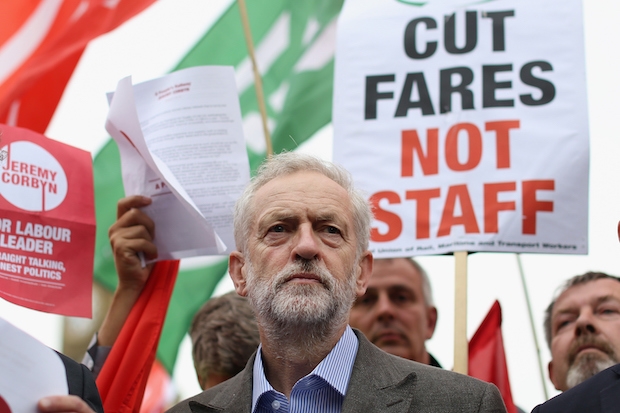Given by most metrics Jeremy Corbyn is on track to win the Labour leadership contest, his policies deserve to be examined and discussed. Based on his speeches and pamphlets, here is a summary of what Corbyn has pledged to do in key policy areas. There is a surprising amount of detail.
Economy
Corbyn’s economic ideas have been outlined in a document: The Economy in 2020. His approach for ‘growth not austerity’ is one of his most comprehensive policy areas. Corbynomics, which we’ve looked at in the past, is based on raising taxes and using the proceeds to invest in the economy. He has promised to ‘cut some of the huge tax reliefs and subsidies on offer to the corporate sector,’ which would amount to some £93 billion a year. The proceeds would be used to create a National Investment Bank.
‘Quantitative easing for people’ is another one of his key policies, as is introducing a more ‘progressive’ tax system, which would affect corporations and high income earners. Corbyn also wants to introduce a £10 living wage and has promised to equalise Jobseekers’ Allowance for all ages. He has pledged to ban zero-hours contracts and enforce a weekly minimum number of hours in contracts.
For a more detailed explanation of Corbynomics, Adam Memon from the CPS has gone through the various different policies here.
Environment
In his Protecting Our Planet manifesto, Corbyn said he wants Britain to provide ‘international leadership’ on climate change. This would include building a ‘modern, green, resource-efficient economy’ and giving everyone access to a home that is ‘low carbon’ and ‘affordable to keep warm’. He also would like to see cleaner air, a more compassionate approach to protecting wildlife and a ‘healthy, safe, environment, where people and nature thrive together’.
Nationalisation
Corbyn has pledged to nationalise the railways and postal service. In an interview with the BBC, he said ‘we want our railway system and our Post Office – Royal Mail rather – in public ownership, they are natural monopolies’. He has also committed to renationalising the ‘Big Six’ energy providers — British Gas, SSE, Eon, Npower, Scottish Power and EDF — as well as the National Grid. There has been some debate about whether he would reintroduce Clause IV to Labour’s constitution, which outlined the party’s commitment to the public ownership of industry.
Education
Corbyn has set out a £10 billion plan to scrap tuition fees and restore student maintenance grants. He apologised on behalf of the last Labour government for introducing tuition fees and said his plan would be paid for by a 2.5 per cent rise in corporation tax and a seven per cent rise in NI contributions for those earning over £50,000 a year. Corbyn has also said he would restore EMA and introduce a National Education Service to give ‘working age people access throughout their lives to learn new skills or to re-train’. In his pledges to young people, Corbyn has promised to introduce compulsory sexual, consensual and relationship education.
Housing
In another pamphlet ‘Tackling the Housing Crisis’, Corbyn has promised ‘decent homes for all’ by 2025 through a significant house building programme. His aim is to allow councils to build at least 240,000 new houses each year. Corbyn would like to extend Right to Buy for private landlords, as well as establishing a Living Rent Commission to cap rent increases and introduce rent controls in the private sector. His housing policy would also include scrapping the so-called bedroom tax and benefit cap.
Foreign policy and defence
In his Defence Diversification pamphlet, Corbyn pledges that a Labour government elected in 2020 would halt the renewal of the Trident nuclear deterrent and push towards disarmament. He proposes that displaced workers from the defence industry would find employment elsewhere in a ‘high skilled, high-tech world leading economy’. He has called for Britain to leave Nato — ‘I’d rather we weren’t in it’ — but will campaign for Britain to remain in the European Union, as long it does not infringe on workers’ rights. Corbyn has also promised ‘no more illegal wars’ and will promote a ‘foreign policy that prioritises justice and assistance’.
Equality
Corbyn’s Working With Women document outlines how he hopes to achieve greater gender equality. He would like to see universal free childcare through the National Education Service, ensure that companies publish equal pay audits and challenge sexism through PSHE education. Corbyn has also committed to a 50 per cent female shadow cabinet if he is elected leader, as well as striving towards 50 per cent of female Labour MPs.
Health
Corbyn has promised a ‘fully-funded NHS, integrated with social care, with an end to privatisation in health’. He has yet to release a document outlining his plans for the NHS but in the past, he has raised mental health in the Commons and his website states the ‘principle of universal healthcare which is free at the point of use is something that we all deserve and should be absolutely protected’.
Middle East
‘I’ve always been a friend of Israel and the Jewish community – that will never change,’ said Corbyn at a hustings hosted by the Jewish Chronicle. He said he supports Israel’s right to exist but opposes what he describes as ‘Israel’s occupation policies’. Corbyn’s views on the Middle East have caused much controversy during the leadership campaign: he has reportedly attended an event hosted by a Holocaust denier and has taken flack for describing Hamas and Hezbollah as ‘friends’. In response, he told the New Statesman ‘look, you don’t make peace unless you talk to everybody’. His campaign have not released any official literature on this topic.






Comments